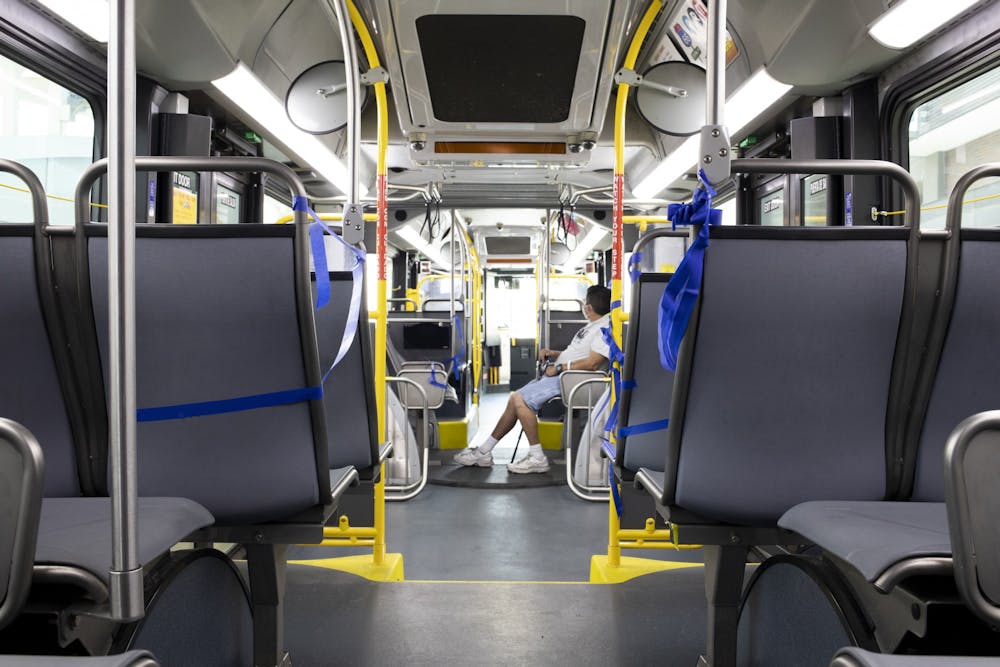On Monday, the Albuquerque City Council passed a pilot zero-fare bus program that will remove fares on all city buses for every passenger for the duration of a calendar year starting on January 1, 2022.
To address concerns brought up in the three previous deferrals of the program, the Metro Security Division within the Department of Municipal Development gave a presentation regarding the program’s safety. They said there would be additional security measures implemented, including funding to add 10 more security officers to the transit department.
Christopher Ramirez, executive director of the transit equity advocate group Together for Brothers (T4B) and chair member of the city transit advisory board, told the Daily Lobo that while T4B is very excited about the elimination of bus fares, they do not support the addition of new officers.
“T4B is going to organize to change that and work with (the departments of) community safety (as well as) family and community services, and other community partners to be part of a community safety plan,” Ramirez said. “Security officers are not the solution and will not make us safe.”
Advocacy groups like T4B have been pushing for a zero-fare ordinance and transit equity for years. A few of these groups, along with the bill’s co-sponsor, Councilor Lan Sena, held a public press conference before the meeting where individuals spoke about how eliminating fares would benefit different communities in the city.
Sierra Ludington, the communications manager for NMCAN, which is a group dedicated to helping foster children succeed, told the Daily Lobo that one of the most common things people come to NMCAN for help with is figuring out how to buy a car; transportation is essential for getting both an education. NMCAN youth organizing coordinator Marco Martinez said it’s also necessary to get to work.
“We know that transportation is literally the No. 1 barrier; they can’t do anything without access to it, and so we know that zero fares mean that that's one less barrier for them to have to navigate, and we can really focus on education, ... on advocacy — the things that we really care about,” Ludington said.
At the city council meeting itself, other community members showed up to the public comment to support the ordinance and share stories of how transit has benefited them, including UNM student and T4B organizer Mahdi Hossaini. Hossaini, a refugee in New Mexico, said to be able to attend a high school that offered a refugee cohort program, he had to utilize public transportation to get there. Councilor Pat Davis, using this example, said public transit is crucial in supporting refugees.
“I think it will be perfect because now our newcomers (are) coming in and they don't have access to transportation, so it's really hard for them to get around the town, and they aren't familiar with what to do,” Hossani said. “And, also, if they have to pay every single day to go around the town, that's really really hard for them.”
Councilors offered little debate about the issue at the meeting, with only a few clarifying questions on the safety presentation. Sena said the percentage of bus-related incidents out of all transit-related incidents involving disruptions or violence is 23.7% and only affects a relatively small number of individuals considering the amount of passengers who ride the bus daily.
In closing remarks, Sena emphasized how important this is for the community, especially the lower-income individuals in the city who utilize public transit daily to get to places like work or the grocery store.
Get content from The Daily Lobo delivered to your inbox
“We all know and have heard from constituents in public comment just how much this has impacted their lives … It’s good as a first start, and will take with the 12 months to see how our ridership increases and how it supports our working families,” Sena said.
Madeline Pukite is a beat reporter at the Daily Lobo. They can be contacted at news@dailylobo.com or on Twitter @madelinepukite






